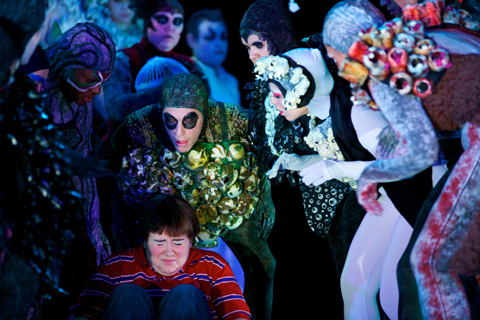French music at the BSO; French opera at Boston Conservatory; plus, Peter Wispelwey, Judith Gordon, Russell Sherman and Frank Kelley, and Collage New Music
By LLOYD SCHWARTZ | February 8, 2012

DELIGHT In the Boston Conservatory staging of Ravel’s L’enfant, furniture and animals literally came out of the woodwork. |
French music is tricky. It has an unmistakable accent, inflection, scent. It's hard to explain, but you know it when you hear it. Swiss conductor Charles Dutoit had the elusive "it" of the French style in abundant display at his latest BSO concert — one of his very best: a program that began with a German work (Richard Strauss) that quotes music by a 17th-century Franco-Italian composer (Jean-Baptiste Lully) written for a French play, Molière's Le bourgeois gentilhomme. This piece can come across as sugary, but when it's dazzlingly and stylishly played, as it was here, it's irresistibly charming. Charm is not the word one would use for Henri Dutillieux's Tout une monde lointain . . . ("An entire distant world . . . "), his austerely atonal but soulful cello concerto inspired by Baudelaire, the solo hero suavely and poignantly played by 31-year-old Gautier Capuçon. And Debussy's La mer emerged not as the usual grand orchestral showpiece, but as an insinuating and subtly sexual symphony.Two marvels of French opera — Ravel's two one-acters — make an ideal pair but are seldom programmed together. So the Boston Conservatory's production of L'enfant et les sortilèges ("the child and the magic spells," 1925) and L'heure espagnole ("the Spanish hour" or "Spanish time," 1911) was a rare treat — not perfect but enjoyable, presenting useful challenges for student performers.
The operas are a ravishing study in contrasts. L'enfant, with a libretto by Colette, is about a naughty child, disobedient, unwilling to work (here he's playing a videogame), and sadistic to the creatures in his garden. When his mother locks him in his room without supper, the objects and animals spring into action and get their revenge. A squirrel gets injured in the fray, and when the child bandages its wound, the creatures realize that he's capable of suffering, of empathizing with those he's tormented, and forgive him.
L'heure espagnole, au contraire, is a sex farce. An old clockmaker's young wife, Concepción, takes advantage of his weekly hour away from the shop to wind the city's clocks — for an assignation, she hopes, with a more virile young poet. But the poet is more interested in his verse, and a more mature older admirer may be too fat to function. Concepción's plans are further complicated by a muleteer who's waiting to have his watch fixed. She has the muscular muleteer carry up to her bedroom the grandfather clocks her lovers have hidden in. Finally, frustrated and with time running out, she invites the muleteer up to her room "sans horloge." When the clockmaker returns, he promises to fix the muleteer's watch, so he can return on the dot every week to give Concepción the right time.
No one writes more seductive Spanish music than the French, and no one writes more colorful music for children than Ravel. The excellent student orchestra played elegantly for conductor Andrew Altenbach, though he might have asked for a bit more rhythmic incisiveness. The student singers were uniformly excellent. My night, Anne Maguire as the Child and Christina Pecce as Concepción were both convincing in their opposite parts. Other nights, Courtney Miller sang both these roles — a tour de force I'd have liked to experience.